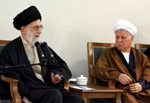 The Guardian: Akbar Hashemi Rafsanjani, the embattled former president of Iran, has finally spoken openly about the rift between him and the country’s supreme leader, Ayatollah Ali Khamenei. The Guardian
The Guardian: Akbar Hashemi Rafsanjani, the embattled former president of Iran, has finally spoken openly about the rift between him and the country’s supreme leader, Ayatollah Ali Khamenei. The Guardian
 Iran’s former president reportedly ends speculation, saying he could not foresee rift with Ayatollah Ali Khamenei being bridged.
Iran’s former president reportedly ends speculation, saying he could not foresee rift with Ayatollah Ali Khamenei being bridged.
Akbar Hashemi Rafsanjani, the embattled former president of Iran, has finally spoken openly about the rift between him and the country’s supreme leader, Ayatollah Ali Khamenei. In a meeting with former state governors from the reformist and moderate camps, Rafsanjani is reported to have put to rest any speculation that he might declare his candidacy for the upcoming presidential election, saying that he did not foresee a situation in which he and Khamenei could work together.
The meeting, according to Saham news agency, was organised by the ex-governors in an attempt to persuade the 78-year-old politician to add his name to the list of candidates. According to those present, he referred to his recent sit-down with Khamenei, saying that the supreme leader apparently does not perceive the country as facing the same problems that concern Rafsanjani. Since the last presidential election in 2009, which was followed by massive protests and a harsh crackdown, Rafsanjani has repeatedly said he believes Iran to be in a state of crisis, both internally and externally, and that only a more pluralistic and moderate approach can solve it.
Rafsanjani’s tenure as president, from 1989 to 1997, was by all measures a repressive period, characterised by tight media control and political assassinations. But after he left office, perhaps as a way of maintaining a foothold in a regime in which Khamenei and his hardline allies have played an increasingly dominant role, he placed his weight behind the reform movement.
Until now, both men have voiced their disagreements through proxies, save for the one occasion, following the disputed 2009 poll, when Khamenei publicly declared that his views were “closer to Mr [Mahmoud] Ahmadinejad’s” than Rafsanjani’s. Ahmadinejad had built much of his 2009 re-election campaign around opposition to Rafsanjani, who was widely seen as a symbol of economic corruption. As the relationship between the supreme leader and Ahmadinejad began to sour, the latter ceased his rhetorical attacks on Rafsanjani. But the conservatives in Khamenei’s camp have managed to systematically isolate and marginalise the former president. Two years ago Rafsanjani lost his position as head of the assembly of experts, the one body in the Islamic Republic’s constitutional system with the theoretical power to supervise and remove the supreme leader. Rafsanjani’s daughter, Faezeh, was sentenced to six months in jail for her open support of the opposition Green movement; and his son, Mehdi, has been in and out of Evin prison on similar, even more serious, charges.
At the meeting with the ex-governors, Rafsanjani is reported to have said “the leader no longer trusts me, though I acted as a brother toward him”.
He reflected further on the history of their relationship, which began as an extremely close political collaboration.
“I was the one who brought Mr Khamenei to Tehran from [the provincial city of] Mashhad and, despite opposition from many revolutionary friends, I facilitated his joining the central committee of the revolution … The rest is well-known.”
Rafsanjani apparently referred to his role in Khamenei’s unlikely ascendency to the supreme leadership. After the death of Ayatollah Ruhollah Khomeini, when Rafsanjani recognised that he did not have sufficient support among the senior clerics to attain the position himself, he played an indispensable role in strong-arming the Assembly of Experts to appoint Khamenei.
Rafsanjani also reportedly lashed out at the Revolutionary Guards during the meeting, criticising the military organisation’s vast economic and political influence. The Guards became a significant economic force during Rafsanjani’s presidential tenure, when he exerted great sway over them. He apparently underplayed this point in his talk, saying that during his presidency the extent of the Guards’ activity was limited to its engineering corps and projects such as national road building. “Now,” he said, “they control the economy as well as domestic and foreign policy and they will not be satisfied with anything short of the entire country.”
Only the supreme leader could rein in the Revolutionary Guards, he added, and seeing how there is no hope for collaboration between himself and Khamenei, “it would not be wise” for him to run for the presidency.
Less than two months before the 13 June election, the list of candidates is still uncertain. A host of different individuals and coalitions have declared their intention to run or put forward a nominee, but the Guardian Council, an oversight body half of whose members were appointed directly by Khamenei, reserves the right to pick and choose among the candidates. Some reformists had hoped that either Rafsanjani or another former president, Mohammad Khatami, whom the regime would have a hard time disqualifying, would enter the campaign.
Others have called for a boycott. While speculation about Khatami’s decision persists, the hardliners seem unconcerned. The only likely competition seems to be between representatives of the conservative groups already in power.


